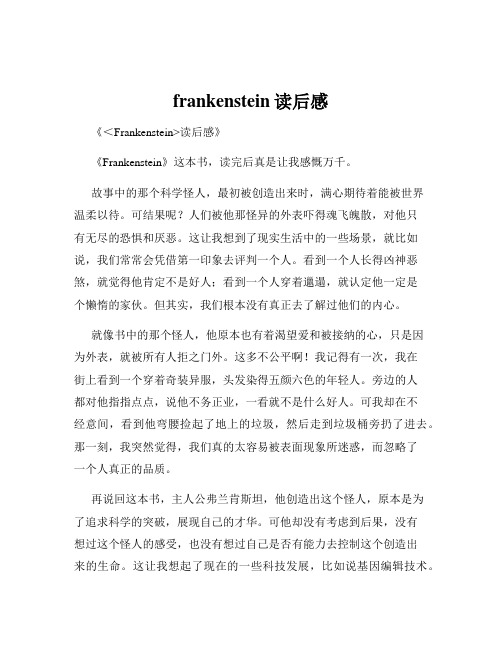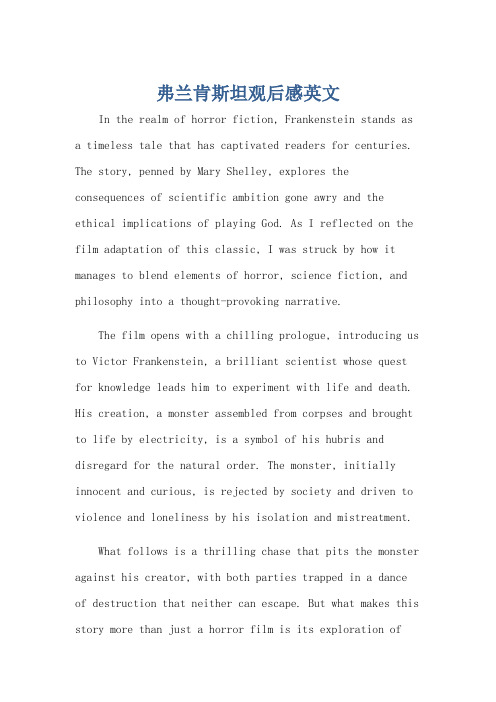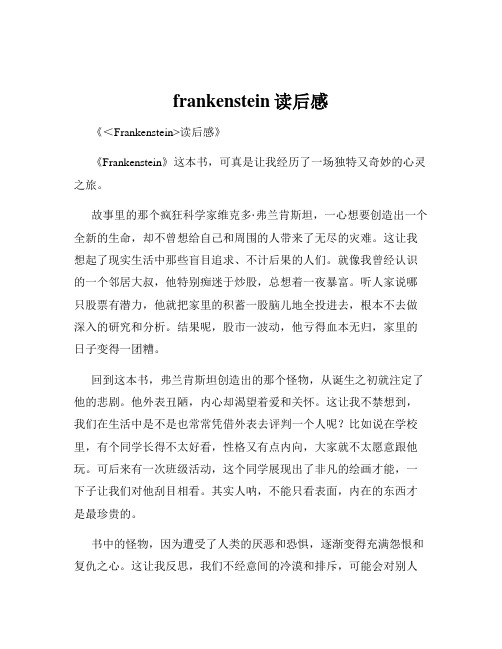弗兰肯斯坦英语读后感Word版
frankenstein读后感

frankenstein读后感《<Frankenstein>读后感》《Frankenstein》这本书,读完后真是让我感慨万千。
故事中的那个科学怪人,最初被创造出来时,满心期待着能被世界温柔以待。
可结果呢?人们被他那怪异的外表吓得魂飞魄散,对他只有无尽的恐惧和厌恶。
这让我想到了现实生活中的一些场景,就比如说,我们常常会凭借第一印象去评判一个人。
看到一个人长得凶神恶煞,就觉得他肯定不是好人;看到一个人穿着邋遢,就认定他一定是个懒惰的家伙。
但其实,我们根本没有真正去了解过他们的内心。
就像书中的那个怪人,他原本也有着渴望爱和被接纳的心,只是因为外表,就被所有人拒之门外。
这多不公平啊!我记得有一次,我在街上看到一个穿着奇装异服,头发染得五颜六色的年轻人。
旁边的人都对他指指点点,说他不务正业,一看就不是什么好人。
可我却在不经意间,看到他弯腰捡起了地上的垃圾,然后走到垃圾桶旁扔了进去。
那一刻,我突然觉得,我们真的太容易被表面现象所迷惑,而忽略了一个人真正的品质。
再说回这本书,主人公弗兰肯斯坦,他创造出这个怪人,原本是为了追求科学的突破,展现自己的才华。
可他却没有考虑到后果,没有想过这个怪人的感受,也没有想过自己是否有能力去控制这个创造出来的生命。
这让我想起了现在的一些科技发展,比如说基因编辑技术。
科学家们为了治疗疾病,想要通过改变基因来达到目的。
这听起来好像很伟大,但是不是也有可能会像弗兰肯斯坦创造怪人一样,引发一些无法预料的后果呢?我们是不是应该在追求科技进步的同时,多想一想可能带来的影响呢?还有那个怪人,他在遭受了无数的拒绝和伤害后,内心充满了仇恨。
他开始报复社会,伤害那些曾经伤害过他的人。
这让我觉得很悲哀,一个原本可能善良的生命,就这样被社会的冷漠和无情给扭曲了。
这让我想到了一些新闻报道,那些因为遭受了不公平待遇或者长期被欺凌的人,最后走上了犯罪的道路。
我们是不是应该反思一下,社会的环境对一个人的影响有多大?我们是不是应该多一些包容和理解,少一些歧视和偏见,让每一个人都能感受到温暖和关爱呢?读完这本书,我一直在想,如果当初人们能够接纳那个怪人,如果弗兰肯斯坦能够对他的创造负责,那么结局会不会不一样?可惜,没有如果。
弗兰肯斯坦观后感英文

弗兰肯斯坦观后感英文In the realm of horror fiction, Frankenstein stands as a timeless tale that has captivated readers for centuries. The story, penned by Mary Shelley, explores the consequences of scientific ambition gone awry and the ethical implications of playing God. As I reflected on the film adaptation of this classic, I was struck by how it manages to blend elements of horror, science fiction, and philosophy into a thought-provoking narrative.The film opens with a chilling prologue, introducing us to Victor Frankenstein, a brilliant scientist whose quest for knowledge leads him to experiment with life and death. His creation, a monster assembled from corpses and brought to life by electricity, is a symbol of his hubris and disregard for the natural order. The monster, initially innocent and curious, is rejected by society and driven to violence and loneliness by his isolation and mistreatment. What follows is a thrilling chase that pits the monster against his creator, with both parties trapped in a dance of destruction that neither can escape. But what makes this story more than just a horror film is its exploration ofthe psychological and moral complexities inherent in Frankenstein's actions. His creation of the monster is not just a scientific experiment gone wrong; it's anexploration of the consequences of playing God and the dangers of unchecked ambition.The film asks profound questions about the boundariesof science, the limits of human knowledge, and the responsibilities of those who seek to push those boundaries. It challenges us to consider the ethical implications ofour actions and the impact they have not just on ourselves but on the world at large. The monster, while a terrifying creation, is also a victim of circumstance, a being drivento violence by the rejection and abuse he experiences. His existence raises questions about the nature of evil and the role of society in shaping it.The film's visual style and pacing contribute to its effectiveness. The dark, gothic setting creates an atmosphere of dread and foreboding, while the tense music and pacing build suspense and keep the viewer on the edgeof their seat. The monster's design, while terrifying, isalso sympathetic, reflecting the film's exploration of the monster's complex emotional life.The acting in the film is also noteworthy. The lead actors, playing both Frankenstein and the monster, deliver powerful performances that capture the emotional and psychological complexity of their characters. Their portrayals make the viewer sympathize with both the creator and his creation, adding depth and resonance to the film's themes.In conclusion, Frankenstein is not just a horror film; it's a profound exploration of the consequences ofscientific ambition and the ethical implications of our actions. It challenges us to consider the boundaries of science and the responsibilities that come with knowledge. The film's visual style, pacing, and acting contribute to its effectiveness, making it a thought-provoking and memorable experience. As I walked away from the theater, I was left with a sense of awe and reflection, thinking about the film's themes and how they resonate in our own world. **弗兰肯斯坦:超越恐怖的深度思考**在恐怖小说的领域里,弗兰肯斯坦是一部跨越时代的作品,几个世纪以来一直吸引着读者。
frankenstein读后感

frankenstein读后感《<Frankenstein>读后感》《Frankenstein》这本书,可真是让我经历了一场独特又奇妙的心灵之旅。
故事里的那个疯狂科学家维克多·弗兰肯斯坦,一心想要创造出一个全新的生命,却不曾想给自己和周围的人带来了无尽的灾难。
这让我想起了现实生活中那些盲目追求、不计后果的人们。
就像我曾经认识的一个邻居大叔,他特别痴迷于炒股,总想着一夜暴富。
听人家说哪只股票有潜力,他就把家里的积蓄一股脑儿地全投进去,根本不去做深入的研究和分析。
结果呢,股市一波动,他亏得血本无归,家里的日子变得一团糟。
回到这本书,弗兰肯斯坦创造出的那个怪物,从诞生之初就注定了他的悲剧。
他外表丑陋,内心却渴望着爱和关怀。
这让我不禁想到,我们在生活中是不是也常常凭借外表去评判一个人呢?比如说在学校里,有个同学长得不太好看,性格又有点内向,大家就不太愿意跟他玩。
可后来有一次班级活动,这个同学展现出了非凡的绘画才能,一下子让我们对他刮目相看。
其实人呐,不能只看表面,内在的东西才是最珍贵的。
书中的怪物,因为遭受了人类的厌恶和恐惧,逐渐变得充满怨恨和复仇之心。
这让我反思,我们不经意间的冷漠和排斥,可能会对别人造成多大的伤害。
记得有一回,我在街上看到一个流浪汉,周围的人都对他指指点点,还远远地躲开。
我本来也想跟着走开,但不知道为什么,脚步就是迈不动。
我走上前去,给了他几块钱和一个面包。
他接过东西的那一刻,眼里满是感激,还对我说了声谢谢。
那一刻,我突然觉得,也许我们一个小小的善意举动,就能给别人带来温暖和希望。
再说弗兰肯斯坦,他在面对自己创造出的恶果时,选择了逃避而不是勇敢面对。
这就好像我们在生活中犯了错,有时候第一反应不是去承担责任,而是想着怎么躲开。
比如我那次不小心打碎了妈妈心爱的花瓶,心里害怕极了,一开始还想着把碎片藏起来,假装什么都没发生。
但后来想了想,还是主动跟妈妈承认了错误。
妈妈虽然生气,但也原谅了我,还夸我诚实。
弗兰肯斯坦读后感(英文)

弗兰肯斯坦读后感(英文)Frankenstein is enormously important as a prototype for science fiction and as an early feminist work.Background of Frankensteincentury London to two influential writers. Mary Shelley was born in 18th-Her mother, Mary Wollstonecraft, was a radical feminist who diedafter giving birth to Mary, and her father, William Godwin, raised her alone.Mary left home at 16, married Percy Shelley after his first wife's suicide, and wrote Frankenstein in a writer's challenge from Lord Byron in 1816-1817. The story, based on a horrendous vision, was composed during sweeping life changes. Frankenstein was published anonymously in 1818. However, the story is enduring in its psychological drama, questions asked, and memorable characterizations. The story has adapted to many forms, with each adaptation telling a very different version of Shelley's original tale.Frankenstein is an advisory notice done up in gothic costume, warning post-industrial society about the explosion of scientific knowledge and its potential misapplication and the subsequent dehumanization of mankind. Much as the silent sci-fi film Metropolis warned of the need for labor unions, Frankenstein warned of the need for considered action in the use of knowledge, and the alienation in storefor driven knowledge seekers. In Frankenstein, Shelley asks who exactly the real monster is.About the Novel: FrankensteinIn the beginning, Dr. Frankenstein is rescued from an ice flow inthe sea near the North Pole. Chased through the Arctic by his Creature, Victor Frankenstein is saved by Captain Walton, who listens to the tale of the quest for knowledge--all gone wrong. Victor describes his childhood as a paradise, where his mother and father indulged him. But, his parents also failed to teach him reality, cause-and-effect, or the principles of respect. With these deficiencies, he considered his adopted sister Elizabeth a possession that he married to own.Elizabeth could not help Victor overcome his addiction to creating a superhuman species. Victor achieved the goal of his addiction and was subsequently repulsed by it. Elizabeth was quite literally killed by his addiction as Victor's Creature destroyed everything that was dear to him. His parents had abandoned his soul in their enabling, and he abandoned his own creation without a name and without a thought.Frankenstein reveals three generations of monsters--personified in Victor's mother, Victor, and the Creature. In addition, Elizabethwas reduced to monster status in her treatment as an object, and Mary Shelley herself was a monster (an educated feminist) who could not put her name to her own work.Victor, the Creature, and Mary Shelley were all different from the mainstream society that rejected them as monstrous: a radical scientist,an inhuman creation, and a feminist without a mother. Victor lost everyone of value, Shelley lost her mother at birth, and the Creature could not fit in anywhere. The Creature's abandonment by parent and society is similar to that of the feminist for over two centuries. Feminists were scorned and abandoned as they obtained knowledge and subsequent power to participate more fully in societies. As portrayed in Katja von Garnier's 2004 film Iron Jawed Angels, feminists were attacked, beaten, and shunned, just as was the Creature in Frankenstein. Shelley must have felt such abandonment and rejection, considering that herfather educated her extensively, but she could not sign her own book.。
frankenstein读后感

frankenstein读后感《<Frankenstein>读后感》《Frankenstein》(《科学怪人》)这本书,读完之后真是让我心情复杂,仿佛经历了一场特别的冒险。
故事里的那个科学怪人,一出场就带着神秘和恐怖的气息。
我读的时候,脑子里一直在想象他那狰狞的模样,高大的身躯,扭曲的五官,还有那充满怨恨的眼神。
但随着故事的推进,我发现这个怪人其实并不仅仅是外表可怕,他的内心世界更加令人震撼。
想象一下,这个怪人诞生在一个阴暗的实验室里,周围都是冰冷的器械和奇怪的药水。
他一睁开眼,看到的不是温暖的笑容和关爱,而是创造者维克多·弗兰肯斯坦那惊恐和厌恶的表情。
这得多伤人啊!他啥也不懂,啥也没做错,就被自己的“父亲”给抛弃了。
他独自在这个世界上摸索,试图去理解周围的一切。
他没有朋友,没有家人,连个能说话的伴儿都没有。
他躲在黑暗的角落里,观察着人们的生活,渴望着能被接纳。
可每次他鼓起勇气靠近人群,得到的都是尖叫和驱赶。
这得多让人心酸啊!有一次,怪人躲在一个小村庄附近的树林里。
他看到一个小女孩在溪边玩耍,那纯真的笑容让他心里涌起一股温暖。
他小心翼翼地走过去,想要和小女孩交个朋友。
结果小女孩一看到他,吓得大哭起来,叫声引来了周围的大人。
那些大人拿着棍棒和锄头,一边喊着“怪物!怪物!”一边朝他冲过来。
怪人只能拼命逃跑,他的心里充满了委屈和不解。
他不明白,为什么自己只是想交朋友,却被这样对待。
还有一回,怪人遇到了一个善良的盲人老头。
老头看不见他的模样,只是通过他的声音和话语,感受到了他的孤独和痛苦。
老头耐心地听他倾诉,还给他温暖的安慰。
那一刻,怪人感受到了从未有过的关爱。
他以为终于找到了一个能理解他的人。
可当老头的家人回来,看到怪人和老头在一起,不由分说地就把怪人赶走了。
怪人的希望再次破灭,他的心也变得更加冰冷。
在这个过程中,我对怪人的感情也发生了很大的变化。
一开始,我和其他人一样,觉得他很可怕,是个应该被消灭的怪物。
frankenstein读后感

frankenstein读后感《<Frankenstein>读后感》《Frankenstein》这本书,就像是一场疯狂而又迷人的冒险,让我一头扎进去,久久不能自拔。
故事的主人公维克多·弗兰肯斯坦,这个疯狂的科学家,用各种尸体的零部件拼凑出了一个巨大的怪物。
这可不是一般的怪物,它有思想、有感情,却因为那恐怖的外表被所有人排斥和厌恶。
我还记得读这本书时,那种紧张又兴奋的心情。
我仿佛能看到弗兰肯斯坦在那阴暗的实验室里,灯光摇曳,各种仪器和解剖工具摆放得乱七八糟。
他的眼神中充满了狂热和执着,汗水顺着他的额头滴落,他却毫不在意,一心只想着创造出一个前所未有的生命。
当那个怪物终于有了生命,第一次睁开眼睛的时候,我都跟着紧张起来。
想象一下,那一双充满迷茫和恐惧的眼睛,在黑暗中闪烁着,不知道自己为何会来到这个世界,不知道等待自己的将会是什么。
怪物的命运实在是太悲惨了。
它从诞生的那一刻起,就注定了要遭受无尽的孤独和痛苦。
没有人愿意接近它,人们看到它只会尖叫着逃跑或者拿起武器攻击它。
它试图向人们表达自己的善意,却总是被误解和伤害。
我真的为它感到难过,它其实就像一个无辜的孩子,被世界无情地抛弃。
有一个情节让我印象特别深刻。
怪物躲在一个小村子的附近,偷偷观察着一户人家的生活。
那是一个温暖和睦的家庭,怪物看着他们在一起欢笑、一起劳动,心中充满了羡慕和渴望。
它多么希望自己也能拥有这样的生活,能有一个人愿意倾听它的心声,能有一个温暖的怀抱接纳它。
于是,它鼓起勇气接近了这户人家,却没想到换来的是更加激烈的恐惧和排斥。
那一刻,怪物的心彻底碎了,它开始变得愤怒和怨恨。
其实想想,我们在生活中不也常常这样吗?我们总是凭借外表或者第一印象去判断一个人,而不去真正了解他们的内心。
这个怪物,虽然外表丑陋可怕,但它的内心也许有着比我们更加善良和温柔的一面。
再来说说弗兰肯斯坦,他创造了这个怪物,却没有勇气去承担后果。
他被自己的创造物吓得落荒而逃,完全不顾怪物的感受。
弗兰肯斯坦典范英语读后感

《弗兰肯斯坦》典范英语读后感In the realm of literature, few works have captured the imagination of readers as profoundly as Mary Shelley's "Frankenstein." This gothic novel, first published in 1818, tells a tale of scientific excess and the consequences of playing God. It is a narrative that explores the boundaries of science, morality, and the nature of life itself.The story revolves around Victor Frankenstein, a young scientist who dreams of creating life. Obsessed with the idea of creating a being of his own design, Victor ignores warnings and warnings from friends and family, and embarks on a dangerous quest that ultimately leads to the creationof a hideous monster. The monster, while initially innocent, is rejected by society and driven to a life of solitude and madness. His anger and despair lead him to seek revenge on his creator, resulting in a series of tragic events that shake the very foundation of Victor's world.What makes "Frankenstein" such a compelling read is its ability to explore themes that are as relevant today asthey were two centuries ago. The novel raises questions about the ethics of scientific research, theresponsibilities of creators, and the consequences of ignoring warnings. It also explores the nature of humanity and our relationship with machines and artificial intelligence.In reading "Frankenstein," I was reminded of the importance of scientific ethics and the need for caution when dealing with technologies that have the potential to upend our understanding of life and death. The story serves as a cautionary tale, warning us of the dangers of playing God and ignoring the warnings of those who have gone before us.The monster, while terrifying in appearance, is atragic figure whose fate is a result of Victor's hubris and neglect. His isolation and rejection by society lead him to a life of loneliness and madness, driving him to seek revenge on the one who created him. This, in turn, leads to a series of tragic events that destroy not only Victor's life but also the lives of those he loves.The moral of the story is clear: we must be responsible for our actions and the consequences they may have. We cannot ignore warnings or play God with technologies thatwe do not fully understand. The cost of such folly can be devastating, not only for ourselves but also for those we care about.In conclusion, "Frankenstein" is a timeless tale that speaks to the core of what it means to be human. It reminds us of the importance of scientific ethics, the responsibilities of creators, and the consequences of ignoring warnings. It is a story that should be read andre-read, as it contains lessons that are as relevant today as they were two centuries ago.**《弗兰肯斯坦》典范英语读后感**在文学的世界里,很少有作品能像玛丽·雪莱的《弗兰肯斯坦》那样深深吸引读者的想象力。
弗兰肯斯坦典范英语读后感

弗兰肯斯坦典范英语读后感From the moment I delved into Mary Shelley's "Frankenstein," I was captivated by the profound narrative that unfolds like a dark, tempestuous night. The novel, a cornerstone of Gothic literature, is not merely a tale of a creature and its creator but a mirror reflecting the deepest fears and ethical quandaries of humanity.The story's opening is as gripping as the premise is haunting. Victor Frankenstein, a man driven by the thirst for knowledge, disregards the moral boundaries of science, and in his quest for discovery, he births a creature of immense size and terrifying countenance. Shelley's portrayal of the monster is a masterstroke; it is not the grotesque exterior that evokes horror but the tragic loneliness and the yearning for companionship that resonates deeply.As the narrative unfolds, the monster's quest for understanding and acceptance becomes a poignant commentary on societal rejection and the human condition. The creature's plea, "I was benevolent and good; misery made me a fiend," is a chilling indictment of a world that judges by appearance rather than merit.Shelley's Frankenstein is a timeless allegory that transcends the gothic genre. It is a story that forces us to confront our own capacity for empathy and the consequences of unchecked ambition. The novel is a stark reminder that thetrue horror lies not in the shadows but in the choices we make and the monsters we create in their image.。
- 1、下载文档前请自行甄别文档内容的完整性,平台不提供额外的编辑、内容补充、找答案等附加服务。
- 2、"仅部分预览"的文档,不可在线预览部分如存在完整性等问题,可反馈申请退款(可完整预览的文档不适用该条件!)。
- 3、如文档侵犯您的权益,请联系客服反馈,我们会尽快为您处理(人工客服工作时间:9:00-18:30)。
The Analysis of Frankenstein’s Humanity
Mary Shelley, one of the most famous female writers in the science fiction, wrote her famous science fiction Frankenstein in 1818. She leaded the romantic period. As her master work, Frankenstein is always regarded as the pioneer of the science fiction.
Mary Shelley mainly told readers a story that Victor Frankenstein wanted to create a good people to help the human, but in fact, he created a monster who is ugly, so that Victor put him away. Because of the prejudice, the monster became a bad man and killed some people in order to revenge Victor. At the end of the novel, the monster regret what he has down, he chose to kill himself. It is a bad ending novel.
This paper will analysis the reasons which causes the bad ending. This paper pays more attention on the humanity that causes the bad ending.
The first reason that causes the tragedy is the desire of Victor Frankenstein. From the fiction, the readers can see that although Victor wanted to make a perfect man that can benefit the human. In the fact, he only wanted to make a successful invention to make himself be famous all over the world. The result
was not as good as he thought, he created a monster, so Victor abandoned the monster. When he faced his invention, he scared what he had done. What he made may destroy his career. At that time, the monster was just like a baby, he did not know anything. Victor did not teach him but put him away. From the explantation, the paper analyses Victor’s desire is the ambition of being success and famous. So the Victor’s desire is the first reason that contributes to the bad ending.
The second reason that causes the tragedy is the people who was saved or helped by the monster. From the novel, the readers can see that at first, the monster was a good man. He helped the old man who was lonely; he saved the little girl who was drowning. However, the monster did not receive any gratitude, but the beat because of his appearance. Then the monster thought that no one would regard him as a good man, so he decided to revenge the Victor. From this reasons, he turned himself a good man to a bad man. So, the people’s attitude is the second reason that causes the bad ending.
The third reason that causes the tragedy is the loneliness. From the novel, we can see, even everyone in the world regard
ed him as a monster; he promised to the Victor that if Victor could create a peer for him, he would not hurt anyone. Victor refused his suggestion, and then the monster thinks that he was the only man who was so strange and ugly, he was very lonely. Then, he decided to revenge the Victor. So lonely is the third reason that causes the bad ending.
The fourth reason is that most people believed that everyone was good when he was born, which made him bad was the environment and the society he lived. People needed to treat the people around them kindly, then they may help a person. From the novel, the readers can see that there are many situations that can make the monster a good man. If Victor did not abandon the monster, if the people who was saved or helped by monster treated him kindly, the monster would be a good one.
There are many reasons that make the monster from innocent to evil. If the readers read the novel carefully, they can find that the monster is not really so bad. At first, he saved the drowning girl, took care of the old man. At the end of the novel, he regret what he had down, and killed himself. The writer thinks that there are many reasons which result in the tragedy, such as Victor, the people who
monster meets, the society and the monster himself. In fact, people had many chances to change the result, but they didn’t. They were scared of him and fighting to him. In this situation, the monster still did not hurt them. If one of them could take care of the monster, he wouldn’t kill Victor’s friend and relatives.
In this thesis, the writer summaries these reasons that contribute to the tragedy, it is Victor’s desire, people’s attitude, the loneliness and the society.
友情提示:本资料代表个人观点,如有帮助请下载,谢谢您的浏览!。
